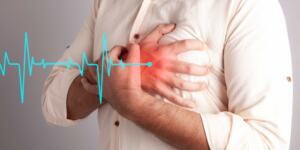We all know that leading a healthy lifestyle is important for our heart health, but did you know there are some foods that can trigger a heart attack?
While we may not be able to entirely avoid these foods, it’s important to be aware of the potential triggers so we can make informed choices about what we eat. Here are the worst offenders when it comes to heart attack triggers:
1. Red Meat
Red meat, such as beef, pork, and lamb, is high in saturated fat and cholesterol, both of which can contribute to heart disease. The American Heart Association recommends limiting red meat consumption to no more than two servings per week.
2. Processed Meat
Processed meats, such as ham, bacon, sausage, and luncheon meats, are also high in saturated fat and cholesterol. They also often contain sodium nitrates, which have been linked to an increased risk of developing cancer. The American Heart Association recommends avoiding processed meats altogether.
3. Sugar-Sweetened Beverages
Sugar-sweetened beverages, such as soda and fruit juice, are high in sugar and calories. Drinking too many sugary drinks can lead to weight gain, which is a major risk factor for heart disease. The American Heart Association recommends limiting sugar-sweetened beverages to no more than 36 ounces per week.
4. Trans Fat
Trans fat is a type of unsaturated fat that’s often found in processed foods like margarine, frozen pizza, and cookies. Trans fat increases your LDL (“bad”) cholesterol levels and lowers your HDL (“good”) cholesterol levels. It’s also been linked to an increased risk of developing diabetes. The American Heart Association recommends avoiding trans fat altogether.
5. Saturated Fat
Saturated fat is found in animal products like butter, cream, and tropical oils like coconut oil and palm oil. It’s also often added to processed foods like crackers and cookies. Eating too much-saturated fat can raise your LDL cholesterol levels and increase your risk of developing heart disease. The American Heart Association recommends limiting saturated fat intake to no more than 13 grams per day.
6. High-GI Cereal Foods
High-GI cereal foods are those that are made with refined grains like white rice and white flour or that contain lots of sugar like cakes, biscuits, and sweetened breakfast cereals. These foods cause your blood sugar levels to spike, which can lead to weight gain and type 2 diabetes.
7 . Salt
Salt is often added to processed foods like lunch meats, canned soups, and frozen dinners. Eating too much salt can raise your blood pressure, which puts you at a greater risk of developing heart disease. The American Heart Association recommends consuming no more than 2 . 3 grams of sodium per day, which works out to be about one teaspoonful.

Making even small changes to your diet can have a big impact on your heart health. By avoiding the worst offenders when it comes to heart disease, you can help keep your heart healthy and reduce your risk of developing this serious condition.
Share this information with your loved ones so that they can also take steps to protect their hearts.

